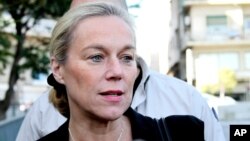UNITED NATIONS —
The Special Coordinator for the Joint OPCW-UN Mission charged with eliminating Syria’s chemical weapons said she expects to know by November 15 where Syria’s chemical weapons will be destroyed.
Sigrid Kaag said Tuesday there were on-going discussions and negotiations this week at The Hague about where the actual destruction of Syria’s chemical weapons would take place.
“Planning teams for the Syrian authorities, U.N. and OPCW experts are convening to look at the details and the best possible options, of course I presume, will be decided upon, and it will be known by the 15th of November,” said Kaag.
Earlier Tuesday, Organization for the Prohibition of Chemical Weapons (OPCW) Director General Ahmet Üzümcü said the most viable alternative for destroying Syria’s chemical arsenal would be outside the country, due to the on-going armed conflict within its borders.
Kaag spoke to reporters after a private briefing to the U.N. Security Council. She said after the joint mission’s first full month of work there has been progress under difficult circumstances.
Kaag said that 21 of 23 sites have been visited. The two sites that have not were due to security concerns. Kaag said the mission intended to visit them in the future, if the situation on the ground allowed.
U.S. Ambassador Samantha Power cautiously welcomed progress on the destruction of specialized equipment used for chemical weapons production, mixing and filling, saying the burden was on the regime of Syrian President Bashar al-Assad to fulfill all of its obligations to fully and verifiably eliminate their chemical weapons program.
“There is nothing yet to celebrate, but it is significant that we have made significant progress toward taking away a potent weapon of war and terror from Assad and his forces,” said the ambassador.
She said the elimination of chemical weapons was not a substitute for ending the violence that has consumed Syria and she urged the immediate expansion of critical humanitarian aid to the country.
The United Nations warned Monday the humanitarian situation was deteriorating rapidly, with 9.3 million Syrians now in need of assistance. Of them, 6.5 million are displaced from their homes, inside the country.
Russia’s U.N. Ambassador, Vitaly Churkin, welcomed news of the Syrian authorities’ cooperation with the joint mission. Asked about the humanitarian crisis, he said the situation would continue to be difficult as long as the conflict went on and this is why efforts needed to be intensified to get the parties to the negotiating table in Geneva.
In Geneva, U.N.-Arab League Syria Envoy Lakhdar Brahimi told a news conference that he hopes peace talks between the government and opposition could still take place before the end of the year.
Originally, the United Nations had been aiming for late November, but the envoy laid out his revised hopes after meeting with U.S. and Russian officials, as well as with diplomats from the other three permanent Security Council members.
Sigrid Kaag said Tuesday there were on-going discussions and negotiations this week at The Hague about where the actual destruction of Syria’s chemical weapons would take place.
“Planning teams for the Syrian authorities, U.N. and OPCW experts are convening to look at the details and the best possible options, of course I presume, will be decided upon, and it will be known by the 15th of November,” said Kaag.
Earlier Tuesday, Organization for the Prohibition of Chemical Weapons (OPCW) Director General Ahmet Üzümcü said the most viable alternative for destroying Syria’s chemical arsenal would be outside the country, due to the on-going armed conflict within its borders.
Kaag spoke to reporters after a private briefing to the U.N. Security Council. She said after the joint mission’s first full month of work there has been progress under difficult circumstances.
Kaag said that 21 of 23 sites have been visited. The two sites that have not were due to security concerns. Kaag said the mission intended to visit them in the future, if the situation on the ground allowed.
U.S. Ambassador Samantha Power cautiously welcomed progress on the destruction of specialized equipment used for chemical weapons production, mixing and filling, saying the burden was on the regime of Syrian President Bashar al-Assad to fulfill all of its obligations to fully and verifiably eliminate their chemical weapons program.
“There is nothing yet to celebrate, but it is significant that we have made significant progress toward taking away a potent weapon of war and terror from Assad and his forces,” said the ambassador.
She said the elimination of chemical weapons was not a substitute for ending the violence that has consumed Syria and she urged the immediate expansion of critical humanitarian aid to the country.
The United Nations warned Monday the humanitarian situation was deteriorating rapidly, with 9.3 million Syrians now in need of assistance. Of them, 6.5 million are displaced from their homes, inside the country.
Russia’s U.N. Ambassador, Vitaly Churkin, welcomed news of the Syrian authorities’ cooperation with the joint mission. Asked about the humanitarian crisis, he said the situation would continue to be difficult as long as the conflict went on and this is why efforts needed to be intensified to get the parties to the negotiating table in Geneva.
In Geneva, U.N.-Arab League Syria Envoy Lakhdar Brahimi told a news conference that he hopes peace talks between the government and opposition could still take place before the end of the year.
Originally, the United Nations had been aiming for late November, but the envoy laid out his revised hopes after meeting with U.S. and Russian officials, as well as with diplomats from the other three permanent Security Council members.




